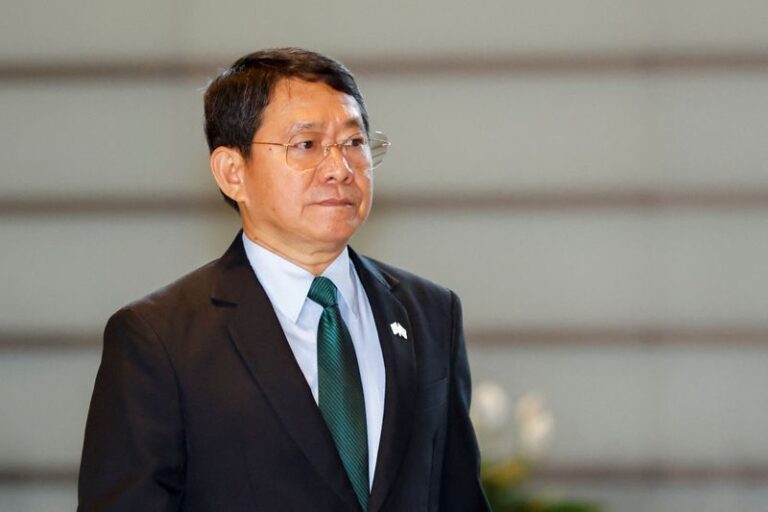By Karen Lema
MANILA (Reuters) – The Philippines’ national security adviser called on Friday for the expulsion of Chinese diplomats over an alleged leak of a phone conversation with a Filipino admiral, in a significant escalation of a bitter conflict over the South China Sea.
The Chinese embassy in Manila has orchestrated “repeated acts of dissemination and disinformation” with the aim of sowing discord, division and disunity, Eduardo Ano said in a statement.
These actions “should not be allowed to go unchallenged without serious sanctions,” he said.
Chinese Foreign Ministry spokesperson Lin Jian called the comments provocative and said Chinese diplomats in the Philippines should be allowed to do their jobs.
“China solemnly requests the Philippine side to effectively safeguard the normal exercise of duties of Chinese diplomatic personnel, stop undermining their obligations and provoking, and refrain from denying the facts,” Xi said. Lin during a regular press briefing in Beijing.
Philippine President Ferdinand Marcos Jr’s office and the Department of Foreign Affairs did not immediately respond to requests for comment.
The two countries have been involved in a series of heated clashes last year in disputed areas of the South China Sea as the Philippines, emboldened by support from the United States and other allies, steps up its activities in the waters occupied by the vast Chinese coast guard.
China has accused the Philippines of intrusion and treason, while Manila has chastised Beijing for what it sees as a policy of aggression and dangerous maneuvers inside its exclusive economic zone.
The expulsion of diplomats could intensify a feud that has so far been marked by heated exchanges, diplomatic protests and the ramming and water cannoning of Philippine ships on two disputed shoals, the nearest of which is more than 850 km (530 miles) from mainland China. .
Ano was referring to a report this week of an alleged leak of a call between a Chinese diplomat and a Philippine admiral discussing a South China Sea dispute, which contained a transcript showing the admiral agreeing to concessions with China.
According to the transcript published by the Manila Times, the admiral agreed to China’s proposal for a “new model,” in which the Philippines would use fewer ships for resupply trips for marines stationed on a warship stranded at the second bank Thomas controversial, and informed Beijing. on missions in advance.
Reuters did not hear the reported telephone conversation and could not verify the contents of the released transcript. The report said the conversation took place in January and that the transcript was provided by a “senior Chinese official,” whom it did not name.
“INTERFERENCE OPERATIONS”
Ano said he supports the defense minister’s call for the Department of Foreign Affairs to take appropriate action against embassy officials, who he said recorded an alleged telephone conversation in violation of Philippine laws, including the law against wiretapping, as well as serious violations of diplomatic protocols. .
“Members of the Chinese embassy… and those responsible for these malicious influence and interference operations must be immediately expelled from the country,” he said.
On Wednesday, Chinese spokesman Lin said the embassy in Manila had released details of “relevant communications” between the two countries on the handling of the situation at Second Thomas Shoal.
Lin, in comments shared by the embassy, did not specify what details or communications were released, or when, but said “the facts are clear and supported by hard evidence that cannot be denied.”
“The Philippines has insisted on denying these objective facts and seeks to mislead the international community,” Lin added.
China has long been upset by the Philippines’ continued small military presence aboard the Sierre Madre at Second Thomas Shoal, where it has been since 1999 in an attempt to bolster its territorial claims.
Beijing has repeatedly said the Philippines agreed to tow the ship, which Manila denies.
Manila-based political analyst Julio Amador said expulsion of diplomats should be part of the Philippines’ diplomatic toolkit and that Chinese embassy officials had shown they were not granting importance to their working relationships with Filipino officials.
“Diplomacy is based on trust, but China is trying to pretend that all meetings between its diplomats and Philippine government officials are negotiations leading to binding results,” he said.
“It has no right to impose demands on the Philippines on how the latter manages areas over which it has sovereign rights.”
(Additional reporting by Joe Cash; writing by Martin Petty; editing by Neil Fullick and Raju Gopalakrishnan)


